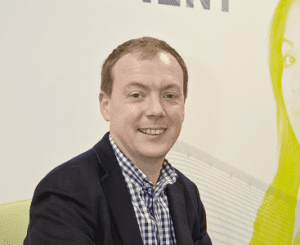My life in the Built Environment: Guest blog by James Ritson, UCEM Programme Leader for the MSc Building Surveying programme
Posted on: 31 January, 2018
Early interest
From a young age, I’d always been interested in creating things. I loved, and still love, puzzles and it was this inherent interest in creating things and piecing puzzles together that led to me having an interest in the Built Environment.
The act of creating something and looking after something which is important to people is what I like about the Built Environment.
Work
I originally trained as an architect completing my Part 1 and 2 degree at Kingston University and worked on the Houses of Parliament and various cathedrals when employed by MBP Architects and Carden & Godfrey Architects.
Academia
I returned to Kingston to do a Master’s in Architecture, specialising in sustainability. It was there that I began working as a teaching assistant before Kingston recruited me to teach on the MSc Building Conservation programme and whilst there, I was a senior lecturer in sustainability of the existing built environment.
I joined UCEM a few years ago and am the Programme Leader for the MSc Building Surveying programme.
Extra responsibilities
My research work within the Built Environment has resulted in me being asked to join ICOMOS (the International Council on Monuments and Sites) on its UK National Scientific Committee on Digital Heritage and its International Scientific Committee on Energy and Sustainability. These extra responsibilities have been fantastic experiences. In my role on the latter committee, I try to provide international guidance on preservation and making what we have more sustainable.
Finding solutions
I love working within the Built Environment. I have always wanted to make a difference.
One of the biggest challenges we have is what is already built, particularly in the western world. You can see where cities need things changed and adapted but it’s complex. I love the challenges they represent. They can be minor like lowering the energy requirement in suburban Victorian houses but it all adds to a more sustainable future.
We face serious challenges such as air pollution in China. All challenges contribute to finding solutions and it is in finding solutions where I derive a lot of enjoyment from my role.
One of the great advantages of architecture and building surveying studies is that it gives you a grounding in the whole of the Built Environment. Having an overview of the whole Built Environment is so beneficial in the modern world.
It’s not just in my field. It’s so important to have professionals who understand professional and corporate responsibility while still meeting the needs of business. Expertise in this area is very much in demand.
There’s a massive housing shortage and building surveying is key to that area.
Being chartered early in your long career is a huge benefit. Whether it’s RICS or CIOB, there are huge advantages to being chartered. Once you become chartered, your career will take off.
MSc Building Surveying programme
The programme gives students a very good overview of the whole Built Environment and allows them to become chartered and specialise in the area they choose. It’s fantastic to have an overview of the whole sector through this programme.
Building surveying covers the whole cycle from helping people to buy their first home to managing large projects and important buildings, such as national monuments.
James has 10 years’ teaching experience within Higher Education and has worked for a variety of architectural firms. James has an MA in architecture and is currently finishing a mid-career PhD. In 2010 he was made a fellow of the Royal Geographic Society for work on sustainability of the built environment. For more about the MSc Building Surveying programme, please click here.






